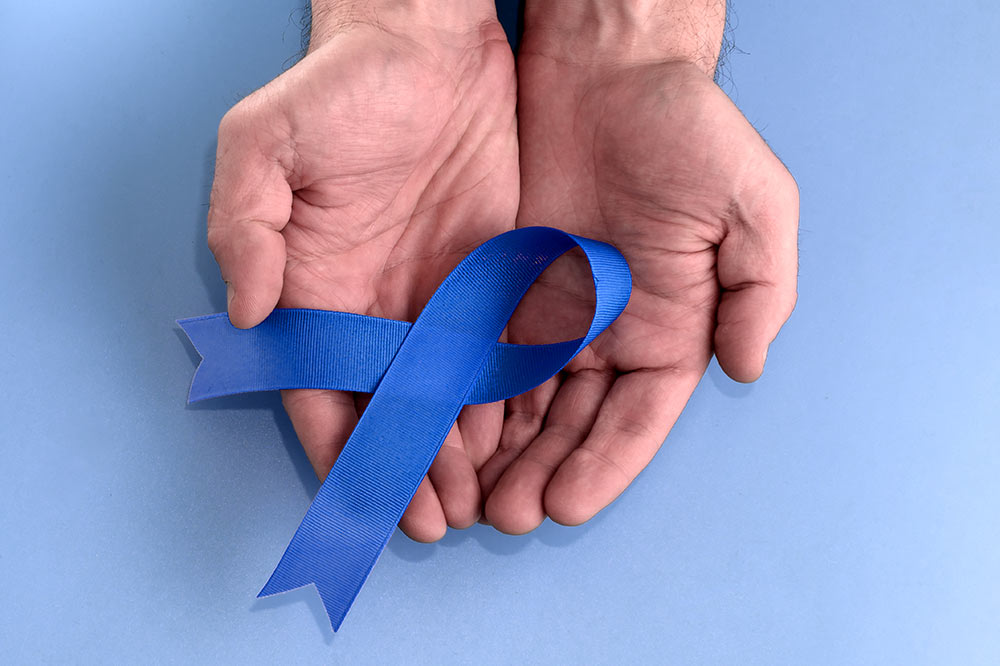March is Colorectal Cancer Awareness month. Colorectal cancer is one of the most common cancers, and it is appearing in younger and younger people. Why? Scientists aren’t yet certain.
“There are lots of theories, but we still don’t really know,” explains Dr. Peter Lee of the Colorectal Surgical Specialists, community members of Arizona Oncology. “Theories include poor diet with consumption of processed meats and foods, the obesity epidemic, and a sedentary lifestyle.”
The American Cancer Society estimates the lifetime risk of developing colorectal cancer is 1 in 23 for men and 1 in 25 for women. And while the number of diagnosed cases has been dropping amongst older adults, cases in people younger than 55 have been increasing at about 1% to 2% per year. And that’s not the only bad news for younger patients.
Don’t Ignore Symptoms
Dr. Lee goes on to explain that outcomes are poorer for younger people diagnosed with the disease. This may be because younger patients may ignore their symptoms, assuming it’s something less serious. As a result, their cancer gets diagnosed at a later stage.
The key symptoms that shouldn’t be ignored are rectal bleeding, changes in bowel habits (new diarrhea or constipation), mucus passage in stool, unexpected weight loss, or anemia. No matter what your age, these symptoms should be checked out, Dr. Lee urges.
“Do not automatically attribute these to hemorrhoids or other benign conditions such as irritable bowel syndrome (IBS), especially if the symptoms do not go away,” he warns. “When symptoms are persistent, it may be your body telling you that something more serious is wrong.”
Screen Sooner Rather Than Later
Because colon cancer has been showing up in younger people, the recommended screening ages have been updated:
- Average risk (no family history of colorectal cancer, no inflammatory bowel disease, no prior history of colon polyps) – Start screening at age 45.
- Family history of colorectal cancer in first degree relative (parent, sibling, or child) – Start screening at age 40 or 10 years prior to the age the youngest affected family member was diagnosed.
- Family history of colorectal cancer in more than one second degree relative (aunt, uncle, grandparent, grandchild, niece, nephew, or half-sibling) – Start screening at age 40 or 10 years prior to the age the youngest affected family member was diagnosed.
- Known genetic defect such as Lynch syndrome or familial adenomatous polyposis (FAP) – Talk to your doctor; screening may need to begin even sooner.
The Importance of Catching Cancer Early
Why are doctors so keen to screen? According to Dr. Lee, there is a significant difference in survival depending on the stage of the cancer at diagnosis.
“According to most recent SEER statistics (a US government database on cancer), 5-year relative survival for localized (early disease Stage 1 or 2) is 90%,” he explains. “Once it has spread to lymph nodes (stage 3) it goes down to 73%. Once it has spread to other organs (liver/lung, etc., stage 4), this goes down to 15%.”
Stool Test or Colonoscopy?
Many people delay colon cancer screening due to fears surrounding a colonoscopy. However, noninvasive screening tools are available, such as Cologuard.
Says Dr. Lee, “Stool tests like Cologuard look at stool DNA and are fairly effective and FDA-approved for screening. We used to use fecal occult blood (tests) before, but I don’t feel that these are as effective anymore since the Cologuard is much better. Still, these screening tests only help you if you test negative, because if you test positive, you are still going to need a colonoscopy.”
Colonoscopies come with an added benefit—cancer prevention. Precancerous polyps can be removed during the procedure so they don’t develop into cancer later on. This is why Dr. Lee recommends them, if the patient is willing.
Stool tests like Cologuard, however, can serve as an easy first step, and Dr. Lee says patients are generally willing to undergo a colonoscopy if their stool test comes back positive.
The “Skinny” on Colonoscopies
Maybe you’ve heard from friends or family members that the colonoscopy prep is the worst part? Dr. Lee confirms it.
“I would still say the worst part would be prepping for the procedure the day before, which is when you essentially take diarrhea medications to clean out your colon so that it will be clean enough from stool to detect small polyps,” Dr. Lee says. This often involves drinking unpleasant-tasting liquids, and lots of them. However, Dr. Lee says there are now “pill preps” available that involve pills and clear liquids of the patient’s choice (i.e. Gatorade, crystal lite, water, etc), making that dreaded step easier.
As for the colonoscopy itself, you’ll sleep through the whole thing, and can expect little to no pain afterwards, although it’s normal to experience some bloating or abdominal discomfort due to the air pumped into your colon during the procedure.
Important Takeaways
Here are a few things to take away from the latest findings and recommendations on colorectal cancer:
- Colorectal cancer is a common cancer which can be deadly but is treatable and even preventable.
- Men and women at average risk should begin colon cancer screening at age 45.
- Get these symptoms checked out, no matter your age: rectal bleeding, changes in bowel habits (new diarrhea or constipation), mucus in stool, unexpected weight loss, anemia
- Colonoscopies are the gold standard and can prevent cancer as well as screen for it
- Cologuard stool test kits can be a first-line screening tool for patients who do not want to have a colonoscopy
Talk to your doctor about your individual risk, and, if it’s time, get screened!
To learn more about Colorectal Cancer, visit https://arizonaoncology.com/colon-rectal-cancer/. To learn more about the Colorectal Surgical Specialists, community members of Arizona Oncology, visit https://arizonaoncology.com/colorectal-surgical-specialists/.



